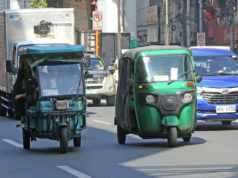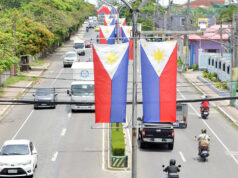Docu fest tackles perception and truth
THIS WEEK, documentary film festival Daang Dokyu is focusing on films that reflect the Philippines’ journey throughout decades of conflicts and issues that continue to hound the country today.
The section, called Nation: Perception is Real, the Truth is Not, runs until Oct. 15, follows last week’s Ecology which talked about the country’s complicated relationship with nature.
Daang Dokyu is a documentary film festival celebrating 100 years of filmmaking in the Philippines by presenting documentaries that chronicle the country’s history. The festival runs online until Nov. 5 and films are free to watch on the website daangdokyu.ph/watchnow.
“If last week’s section, Ecology, is the ruined body, the Nation section is the battered soul. So if you have been following Daang Dokyu’s program over the past weeks, I’m sure your heart has gained enough additional muscle to journey with us through this new section. These documentaries are not easy to watch, but by seeing them, something is gained, something is given to the Filipino viewer,” Jewel Maranan, one of the film festival’s directors, said in a statement.
The section, “interrogates both historical memory and the documentarists’ complex relationship with truth and view of reality,” according to a press release.
Films in this section are Aswang (2019) by Alyx Arumpac; Yanan (2013) by Mae Caralde; May Istorya nga Tayo, Patay Naman Tayo (2001) by The Probe Team, directed by Howie Severino; Mendiola Massacre (1987) by Lito Tiongson, produced by AsiaVisions through IBON Foundation; Marcos: A Malignant Spirit (1989) produced by ABS-CBN News, hosted by Angelo Castro, Jr.; A Rustling of Leaves: Inside the Philippine Revolution (1988) by Nettie Wild; Sa Mata ng Balita: The Birth of Philippine TV, The News and Many Firsts, Unos at Puntos sa Bagong Milenyo (2003) by Ricardo Trofeo, produced by ABS-CBN News; Tupada ‘92: The Philippines in the Year of the Elections (1995) by Fruto Corre; Maid in Singapore (2004) by Clodualdo Del Mundo, Jr.; The Delano Manongs: Forgotten Heroes of The United Farm Workers Movement (2014) by Marissa Aroy; and Queer Transnational Love in the Time of Social Media and Globalization (2017) by Adrian Alarilla.
“In these documentaries — from urban to rural; from Manila to Mindanao to the US — we see how common Filipinos seek survival in the face of poverty, injustice, discrimination, etc. Some chose to feature the act of documenting as dissent, some took up arms, others went to find greener pastures in other countries. These comprise the texture of rich experiences, always reflected upon with the Filipino identity as an index. In effect, the section maps a mediation of a nation where nation is not a given but one that has always been negotiated and fought for,” says Adjani Arumpac, one of the festival’s curators. Ms. Arumpac is the sister of Alyx Arumpac, the director of Aswang.
Aswang, which had its online Philippine premier in July, documents the killings and atmosphere of fear in the streets of Manila and other parts of the country under the current administration’s drug war that is largely affecting the city’s poor.
Yanan meanwhile depicts the remembrance of Ka Yanan, a member of the revolutionary armed movement who died during an encounter with government troops, through letters and memoirs left with her son and two daughters who survived her. In May Istorya nga Tayo, Patay Naman Tayo relates Howie Severino’s experience with fellow journalists caught in the crossfire in covering the siege in Lamitan, Basilan in 2001.
Three films, Mendiola Massacre, Marcos: A Malignant Spirit, and A Rustling of Leaves: Inside the Philippine Revolution, shown during the festival’s launch week in September are having reruns this week.
Sa Mata ng Balita: The Birth of Philippine TV, The News and Many Firsts, Unos at Puntos sa Bagong Milenyo looks back on the 50 years of television history. Tupada ‘92: The Philippines in the Year of the Elections shows the coverage of the 1992 Philippine national elections with inserts of a seer’s ominous visions, including the return to power of the Marcoses. Maid in Singapore explores the lives of three women working as domestic helpers in Singapore. The Delano Manongs: Forgotten Heroes of The United Farm Workers Movement tells the story of Larry Itliong and a group of Filipino farm workers who instigated one of the American farm labor movement’s finest hours; and Queer Transnational Love in the Time of Social Media and Globalization analyzes the possibilities and impracticability of queer, long-distance love.
“Each film in the section is a story and slice of the Filipino reality worth knowing. But seeing the films altogether gives the viewer something more — a window to historical consciousness. By curating films that bring out interconnected realities, the program offers a vantage point. This is the real harvest. By allowing each film to expand the context of the next film, we discover the power of documentaries that seems to feed on time, which continues to link together, swell and add up as the closest we can have of — a social memory. This is the real farm,” Ms. Maranan said in the release.
Aside from the films presented in the festival, Daang Dokyu is also holding masterclasses for free via its Facebook and YouTube channels.
On Oct. 14, Alyx Arumpac, director of Aswang, will be holding a masterclass on the introduction to documentary filmmaking: seeing it develop from a personal idea to a work seen by the wider public. Documentary Filmmaking 101 streams starting 2 p.m.
For people who want a historical view on how documentaries developed in the country, a masterclass by historian Nick de Ocampo is scheduled on Oct. 21, 4 p.m. In the masterclass, called Historya ng Dokyupelikula, Mr. de Ocampo will discuss the beginnings and movement of documentary filmmaking in the Philippines, through two World Wars, and from revolution to revolution.
Another masterclass, focusing on the current state of Philippine journalism, will be held on Oct. 23, 8 p.m. The class will be headed by veteran journalists Roby Alampay, Ging Reyes, Maria Ressa, John Nery, and Sheila Coronel, while GMA Network documentarists Raffy Tima, Atom Araullo, and Kara David will hold a masterclass on Oct. 30, 4 p.m. where they will impart their knowledge in producing documentaries for television. — ZBC



